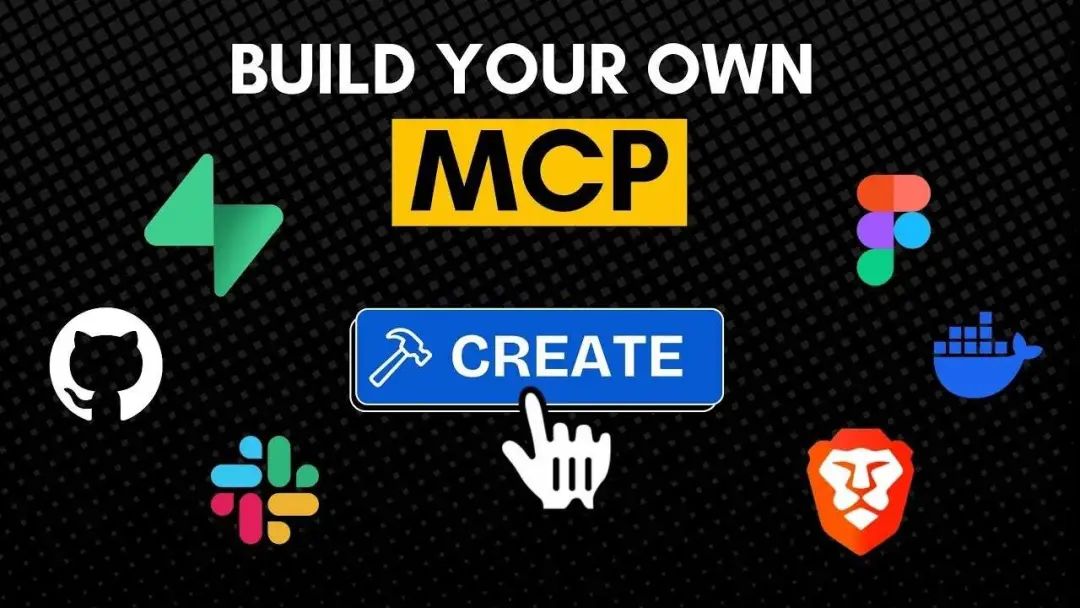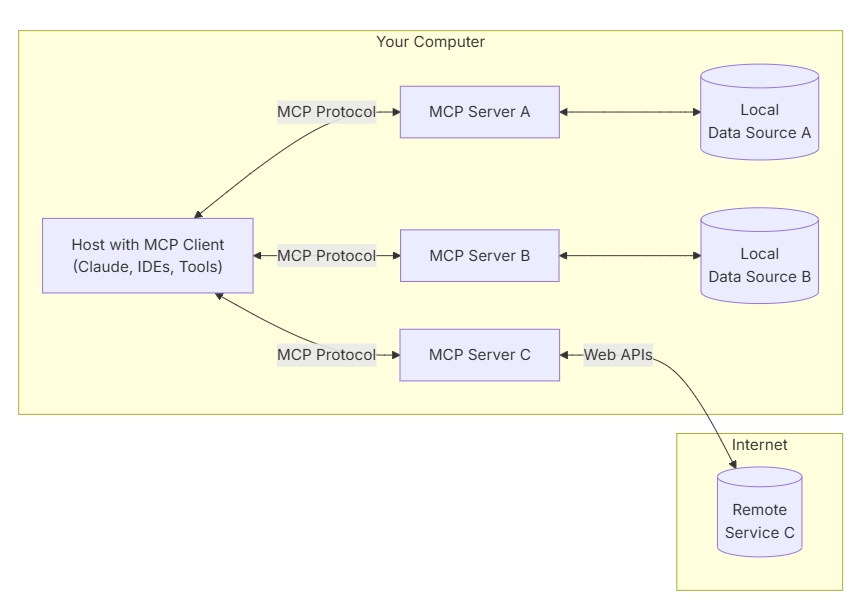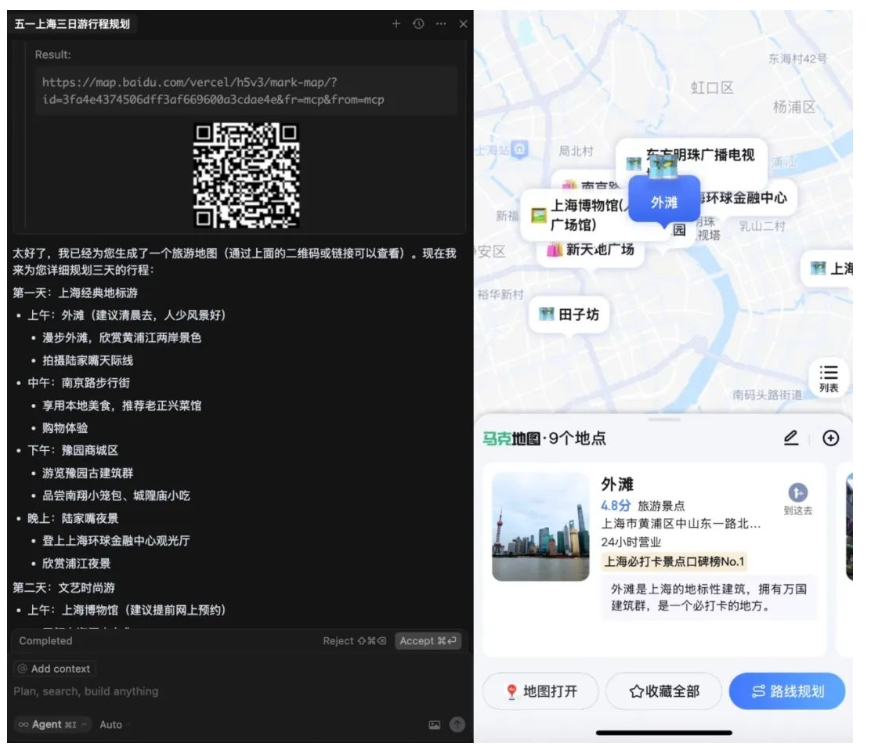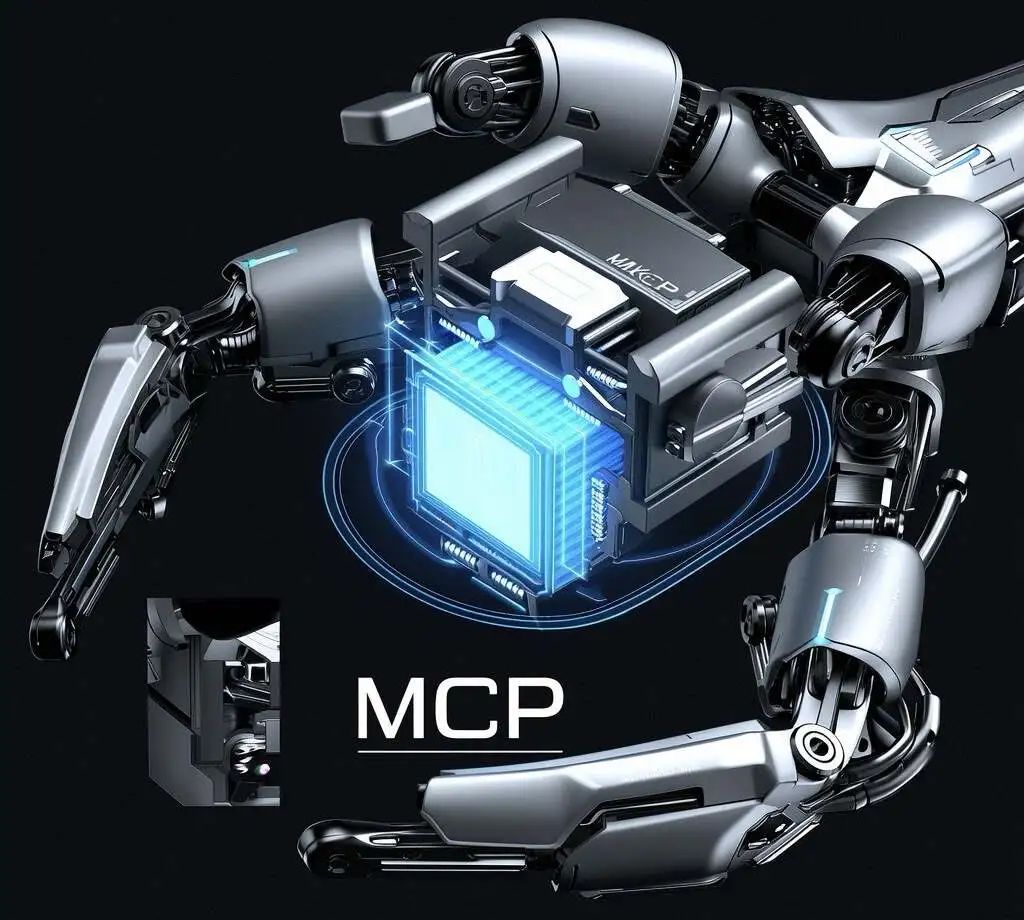Big Tech Firms Kick Off the MCP Overtime Race
![]() 05/06 2025
05/06 2025
![]() 459
459

Author | Lin Feixue
Editor | He Kun
Operations | Chen Jiahui
Produced by | LingTai LT (ID: LingTai_LT)
Cover image | Publicly available image from the internet
Imagine your phone requiring connections to a charger, headphones, and a USB drive simultaneously, yet each device demands a distinct interface. This "interface anxiety" was once a shared nightmare. In the AI era, if every tool (such as payment, navigation) necessitates an independent "interface" (API), developers and users would be forced to repeatedly "change plugs".
Fortunately, the AI world's "universal socket," MCP (Model Context Protocol), is unifying interface standards, enabling different functions and tools to be "plug-and-play".
For instance, an AI agent for food delivery can automatically access restaurant data, payment discounts, and logistics interfaces from multiple platforms via the MCP protocol, eliminating the need for developers to interface with each one individually. We can think of this AI agent as a "super butler," capable of not only understanding instructions but also actively invoking multiple tools to complete tasks.
Suppose you say, "Go to Hangzhou to play," it can automatically plan your itinerary, book tickets, and calculate your budget. All of this hinges on the MCP protocol breaking down barriers between tools.
As this "universal socket" transitions from the lab to the global stage, a recent "AI arms race" has erupted among domestic tech giants.
This smokeless war could shape the future landscape of tech giants in the AI agent era.

Big Tech Firms Rush to the 'Universal Socket' to Rewrite the Rules of the Game
According to comprehensive information from Tianyancha and a report released by MarketsandMarkets in November 2024, the market size of AI agents is projected to grow from $5.1 billion in 2024 to $47.1 billion in 2030, with a compound annual growth rate of 44.8%.
As the "golden key" to unlocking the multi-billion-dollar market for AI agents, major vendors are racing to adapt their technologies and implement scenarios based on MCP. From aggregating resources across multiple fields to focusing on vertical scenarios, and from expanding multi-modal capabilities to building commercial closed loops, AI agents are evolving from command response to cross-modal task collaboration under the auspices of big tech firms.
MCP (Model Context Protocol) was unveiled in November 2024 by Anthropic, defining a standardized way of interaction between AI models and external systems.

▲Diagram: MCP Protocol's official website - MCP Protocol architecture diagram
The core of this protocol directly points to a "unified communication protocol," providing a standardized interaction framework for AI models and external tools, supporting the dynamic discovery of available services.
Upon its release, the protocol garnered significant attention both domestically and internationally.
April 2025 marked a crucial juncture for domestic tech giants to densely deploy MCP+AI agents.
Among them, Baidu has constructed a three-tier system of "Model-MCP-Application" through the "Qianfan Platform," opening up search and map capabilities to create an "MCP Plaza." Tencent has integrated location services, WeChat Reading, and other plugins based on its knowledge engine, supporting custom MCP plugin calls. Alibaba has launched a "Payment MCP Server" to connect the entire transaction chain, while Alibaba Cloud's Bailian offers development tools such as "MCP Plaza" and open-sources the Qwen3 model integrated with MCP, enhancing Agent capabilities. Additionally, ByteDance is conducting internal testing of the general Agent product "Kouzi Space" to explore MCP integration but has yet to open up capabilities on a large scale.
According to Tianyancha media, the MCP protocol's popularity among vendors and developers stems from its breakthrough of API development model technical bottlenecks.
Historically, APIs were the primary means of interconnection between tools, with independent interface standards and platform compatibility differences for different tools, necessitating developers to invest considerable effort in writing adaptation code, which was inefficient and costly.
The advent of the MCP protocol provides a unified standard, enabling different services and tools to be easily connected to large models and AI agents like "plug-and-play".
This solution to API interface fragmentation not only allows big tech firms to see opportunities to enhance their technical collaboration capabilities but also propels them to gain a first-mover advantage in the ecological layout of AI agents.
Observing the layouts of various big tech firms, one question arises: why are big tech firms heavily investing in, or even "All IN" on MCP+AI agents? What kind of "treasure" are they betting on behind the scenes? And what kind of future landscape does this seemingly similar strategy suggest?
As AI agents gain popularity on both TO B and TO C ends, which big tech firm can compete for more market share and occupy an advantageous position in the future is perhaps the key to this "competition race".

Three Layers of Ecological Chain Behind the Frenzy
Based on the MCP protocol, big tech firms' strategic layout to dismantle technical barriers and integrate tools and services is not merely about securing first-mover advantages but also about future bets. After all, the MCP protocol's impact on the industry is just beginning to emerge.
Currently, there may be three layers of ecological chains in the field of AI agents powered by the MCP protocol.
The first layer involves "cost reduction and efficiency enhancement" and "spontaneous alignment" for developers. As a unified standard, MCP offers positive technical support for the development of AI agents, addressing many long-standing pain points for developers, particularly in terms of development efficiency and tool interoperability.
MCP+agents, through a unified interface standard, facilitate the easy connection of different tools and services without requiring additional adaptation work by developers.
For developers, the greater benefit lies in the "spontaneous alignment" fostered by the MCP protocol. Previously, AI application development often required a large team and high capital investment focused on a particular platform. However, based on the MCP protocol, developers vote with technical merit, and user choices are influenced by both habit and experience.
The second layer is that when big tech firms and developers synergize, the explosion of AI agents can also benefit ordinary users. In fact, the popularization and application of the MCP protocol signify a leap in AI experience for C-end users.
Whether it's managing daily affairs through AI agents or planning travel itineraries, the introduction of the MCP protocol makes these services more intelligent, precise, and efficient.
For instance, when users utilize smart itinerary planning tools, they can achieve seamless connection between large models and services such as Baidu Maps, hotel reservation systems, and weather forecasts through the MCP protocol, ultimately providing users with optimal travel plans, all at their fingertips, without the need to frequently switch between apps or webpages.

▲Diagram: Baidu Maps' official website
The third layer is the "competition race" among big tech firms, ultimately pointing to the commercialization of the MCP+AI agent ecosystem.
Although AI agents are still in a relatively nascent stage of cognitive education, and there is even a lack of a unified definition and recognized standards within the industry, how AI agents can be connected to commercialization paths is the more imaginative interest "pyramid".
Because of this, big tech firms actively responding and promoting the popularization of AI agents based on the MCP protocol are expected to achieve greater accessibility of scenarios, services, and products on the foundation of the existing AI ecosystem.
This accessibility translates into an improved user experience. Once user habits are formed and new interaction methods become mainstream, the MCP-based AI agent ecosystem of big tech firms will have the potential to form a commercial closed loop.
Of course, commercialization is not merely a derivative of the ecosystem but also a core engine driving the implementation of "new infrastructure." Unlike the hardware attributes of traditional infrastructure, MCP+AI agent "new infrastructure" is a soft protocol connecting ecosystems, and its value lies in dismantling data and tool silos.
As more developers and enterprises join, MCP+AI agents will demonstrate their potential and application value in various fields such as life services, the internet industry, and even manufacturing and finance, potentially becoming an emerging force driving the process of intellectualization.
However, with the widespread application of the MCP protocol, industry competition will inevitably intensify. In this "competition race," those who can make breakthroughs in technology and build an open and interconnected ecosystem are likely to occupy an advantageous position in future competition.

The Deep Game of Equal Capability
With the popularization of the MCP protocol and the rapid development of the AI agent ecosystem, competition among major vendors in technology and the market is intensifying. Future competition will no longer be limited to the comparison of single products but will evolve into a deep-level game based on "equal capability".
Although big tech firms can temporarily occupy advantageous positions based on their existing strengths in the short term, the open nature of MCP+AI agents may dilute the original barriers of differentiation.
In this competition, differentiated "open competition" may not be able to compete with "hidden struggles" in new scenarios, and the latter may become the deciding factor in user usage duration, functional coverage, and other dimensions.
This is because differentiation is a static advantage, while scenarization is a dynamic capability. Whoever can quickly integrate cross-border services such as "food delivery + travel + social media" is likely to define new rules. The MCP protocol, akin to a "universal socket," modularizes the core functional modules of big tech firms into pluggable services, callable and combinable by any developer.
The resulting "equal capability" makes differentiated advantages no longer exclusive, shifting the focus of competition to how to combine multi-scenario services.
From the perspective of differentiated "open competition," big tech firms all enter the MCP battlefield with their existing advantages as a springboard. Baidu focuses on integrating tools such as search and maps, Alibaba excels in transaction closed loops, and Tencent expands social scenarios, each with clear differentiated paths.

The different strengths of big tech firms are not only the crystallization of years of "struggle" but also "killer moves" to attract developers and users amidst the tide of artificial intelligence.
However, compared to differentiated "open competition," "hidden struggles" based on new scenarios may start with MCP+AI agents "tearing off" the differentiated labels of big tech firms.
Tianyancha media's comprehensive information indicates that the "scenarization" of MCP+AI agents will become increasingly apparent as big tech firms deploy and a large number of developers enter the market. In this process, the original differentiation based on products, applications, and functions will gradually "fade," giving way to a new competitive landscape centered on "scenarios" rather than "products".
Furthermore, the application scenarios of AI agents will diversify, and traditional business boundaries will no longer be absolute competitive barriers between tech giants.
Especially with the rapid penetration and widespread popularization of MCP+AI agents among users, the existing core capabilities of big tech firms will no longer be confined to the inherent advantages of their own platforms but will be determined by how developers utilize the tools of big tech firms, more flexibly and deeply integrating with more tools, functions, and capabilities to provide to users.
When big tech firms encapsulate their core functions as MCP "standardized plugs," developers can freely call them like inserting into a socket. Thus, the exclusive capabilities of big tech firms become "universal sockets" in an open ecosystem.
This kind of order reconstruction based on "scenarios" also indicates that the future MCP+AI agent "arms race" will not only be a confrontation between single functions and applications but also a "packaged" form for big tech firms to provide developers with more complex and diverse application building capabilities, which will then be distributed to hundreds of millions of users by big tech firms and developers.
This also shifts the focus of competition from a single product or function to how to win in terms of service and experience in multi-dimensional scenarios, thereby gaining a larger market share in different ecosystems.
From distinct 'open competition' to scenario-based 'hidden struggles', MCP+AI agents are reshaping the competitive dynamics among big tech firms. Instead of merely relying on traditional technological supremacy, these agents aim to enhance competitiveness through the creation of dynamic balance, fostering openness and interconnectivity among tech giants via the establishment of agent ecosystems and scenario-specific applications.
The interplay of MCP+AI agents is still in its nascent stages, and the future AI agent ecosystem promises to be increasingly intricate, brimming with unforeseen possibilities. Hence, all transformations and realignments are merely the beginning.

Closing Remarks
MCP+AI agents usher in changes not only in AI technology empowerment and user inclusivity but also, more profoundly, as the cornerstone of AI. They are poised to achieve universal adoption and commercial application, catalyzing a fresh wave of innovation within the AI industry.
With the aggressive deployment by major tech firms, AI agents will transcend being mere tools; they will evolve into personal intelligent assistants, becoming indispensable companions in our work and lives and even serving as 'accelerators' for the intellectualization of various industries.
As AI agents morph into 'digital organs,' humans can concentrate on creative decision-making, delegating repetitive tasks to these agents for seamless collaboration. This is the ultimate essence of this technological revolution.








